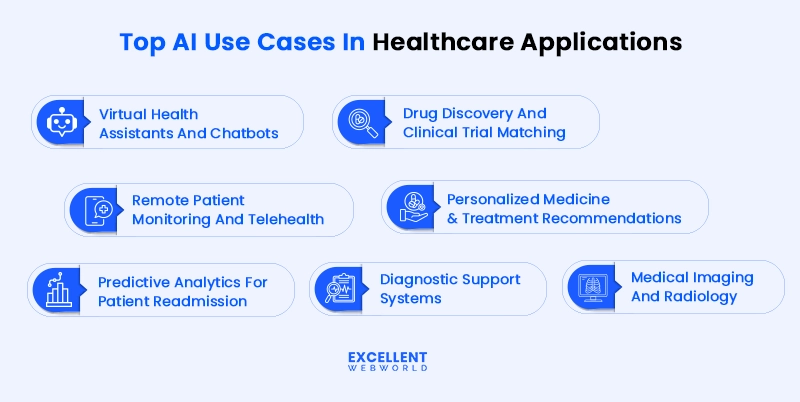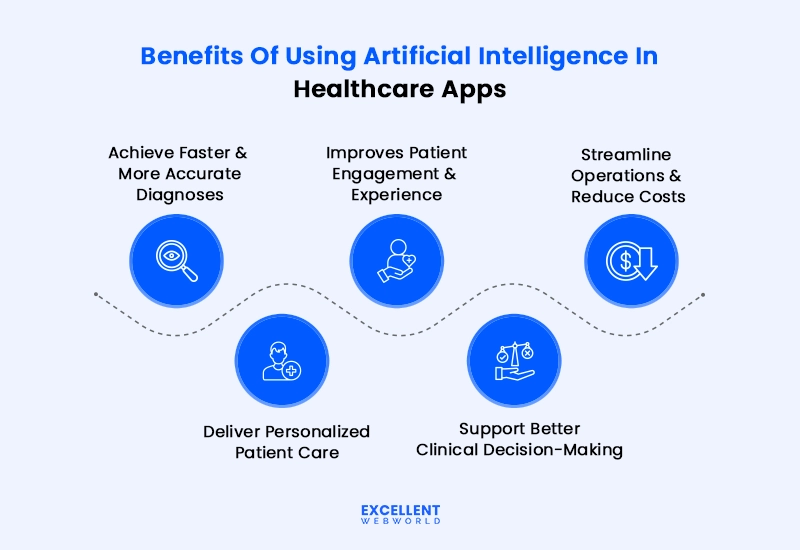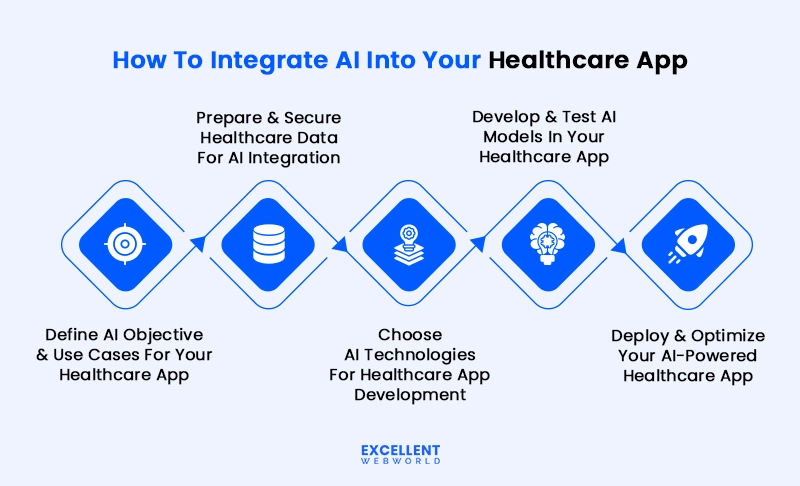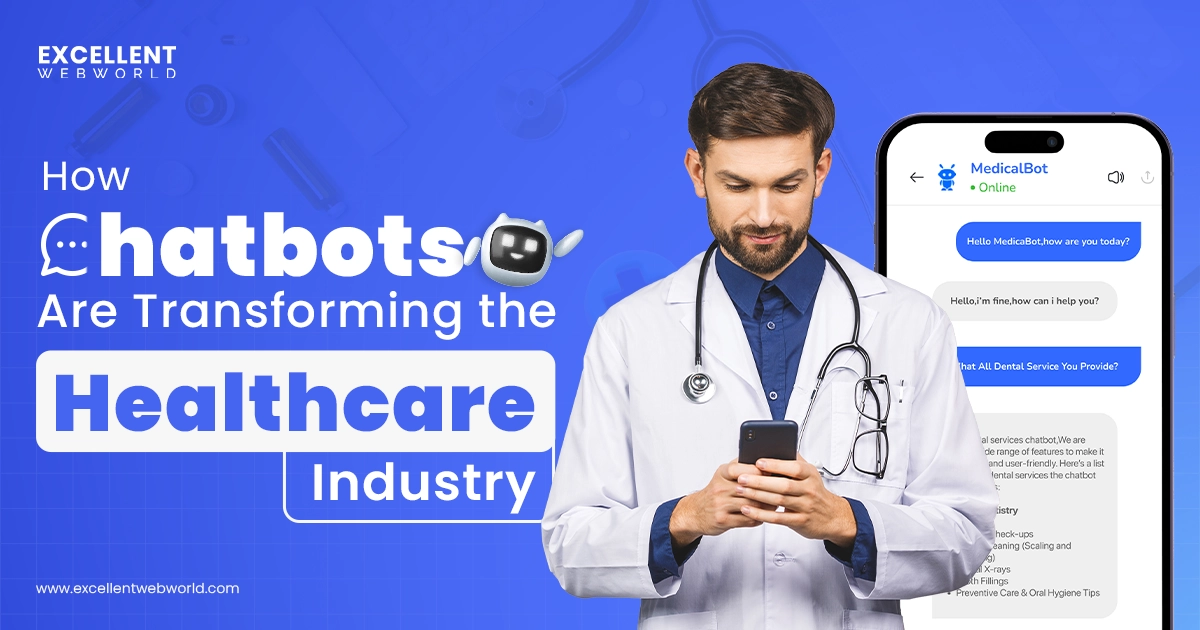Why do businesses need to navigate towards using AI in healthcare app development? Because patients expect quicker access to care. Clinicians need accurate insights in real time.
Yet, a majority of healthcare apps run on inefficient manual processes and legacy data systems. The consequences? You face longer wait times, heavier staff workloads, and dissatisfied patients.
Hospitals, clinics, and startups alike are being challenged to expedite diagnoses and control expenses without compromising patient outcomes. AI-powered healthcare apps address these pressures by introducing tools for virtual consultations and consistent patient monitoring.
AI in healthcare is moving from pilot projects to real-world use. From AI-assisted diagnostics to remote patient monitoring, the technology is already proving its value. The role of AI in healthcare app development is changing how medical apps work.
However, developing an AI-powered healthcare app demands proper tech stack planning, medical-grade accuracy, airtight compliance, use case alignment, and seamless integration with hospital systems.
With 13+ years in healthcare technology, Excellent Webworld has successfully delivered 100+ healthcare projects from AI-based virtual assistance to HIPAA-compliant telemedicine platforms. Let our experts guide you through how AI is used in healthcare app development and how it drives better healthcare results.
What Is AI In Healthcare App Development?
AI in healthcare app development means integrating artificial intelligence technologies like machine learning, natural language processing, and computer vision into healthcare applications. Such a bunch of technologies allows apps to analyze complex medical data and personalize treatment recommendations.
For example, think of an AI-powered telemedicine app that tracks heart rate and oxygen levels from a wearable device. The app identifies irregular patterns that indicate heart-related issues and alerts the doctor to early intervention.
As AI continues to reshape how healthcare apps interact with patients and process medical data, healthcare app development is becoming more focused on building intelligent systems rather than static tools.
After knowing “what is the role of AI in healthcare?”, it becomes easier to understand how it supports both clinical and operational needs. Let’s learn the AI technologies that drive healthcare app development.
AI Technologies That Drive Healthcare App Development
AI in healthcare app development relies on various technologies that analyze data and automate tasks, each serving a unique role. However, collectively, they raise the bar for what healthcare apps can achieve. If you look at recent AI in healthcare statistics, you’ll notice a consistent uptick in adoption rates. Now, let’s check out each technology:
| Technology | What It Brings to Healthcare Apps | Real-World Example |
|---|---|---|
| Machine Learning & Predictive Analytics | Turns patient data into actionable predictions for early care and personalized treatments. | Forecasting patient readmission risks after surgery. |
| Natural Language Processing (NLP) | Simplifies clinical documentation and enables voice-powered app navigation. | Auto-converting doctor-patient conversations into structured EHR data. |
| Computer Vision | Reads and interprets medical images faster than manual review, aiding quicker diagnosis. | Detecting early-stage tumors in MRI scans. |
| Robotic Process Automation (RPA) | Automates repetitive admin tasks to cut errors and save time. | Processing insurance claims without human intervention. |
1. Machine Learning & Predictive Analytics
Machine learning identifies hidden patterns in patient data and adapts over time. It allows apps to provide risk predictions and treatment recommendations automatically. Predictive analytics improves planning by spotting health risks early. It also improves patient outcomes and reduces emergency visits.
2. Natural Language Processing (NLP) For Clinical Notes & Voice Commands
Natural language processing eliminates the complexity of manual documentation. What it does is instantly convert handwritten notes and conversations into usable digital formats and offers hands-free controls for doctors and patients.
3. Computer Vision For Diagnostics And Imaging
Computer vision powers healthcare apps to deliver more accurate imaging analysis compared to traditional one. The technology supports radiologists by improving diagnostic precision and reducing turnaround time.
4. Robotic Process Automation For Administrative Tasks
RPA takes care of predictable administrative processes. It streamlines scheduling, payments, and claim validation. Removing manual dependency simplifies operations and allows staff to dedicate more attention to clinical care.
Top Use Cases of AI In Healthcare Applications
The growing role of AI raises a common question: “How can AI be used in healthcare?” Here are some of the leading use cases of artificial intelligence in healthcare apps.
1. AI In Virtual Health Assistants And Chatbots
Rising patient queries and call volumes put immense pressure on healthcare providers. Virtual assistants powered by artificial intelligence manage this communication overload by managing patient queries, appointment scheduling, and preliminary health assessments.
Not like simple FAQs, these assistants learn from every interaction and deliver accurate responses. These chatbots in healthcare are far more advanced than simple FAQ tools
Example: AI symptom checker by Ada Health asks patients guided questions, then compares the responses with a medical knowledge base, and finally provides personalized triage advice. It then directs users to appropriate options, including virtual consultations. Such solutions represent the future of chatbots in healthcare.
2. AI In Diagnostic Support Systems
Diagnostic errors delay treatment and increase healthcare costs. AI-powered diagnostic systems scan structured records like lab tests and also unstructured sources like radiology notes to detect diseases early.
Acting like a digital second opinion, AI helps doctors make faster and even more accurate diagnoses. Integrating AI in healthcare app development for diagnostic support enables doctors to quickly cross-check patient results against large medical datasets.
Example: The AI platform of Aidoc scans CT images for signs of conditions like pulmonary embolism and intracranial hemorrhage. The system alerts radiologists in real time, which helps prioritize urgent cases and reduces diagnostic delays.
3. AI In Remote Patient Monitoring And Telehealth
You know, right? Patients with chronic conditions need constant monitoring, which is hard to handle manually. Here, AI-powered healthcare apps continuously observe patient health data and warn providers about critical readings. This includes:
Adding such capabilities transforms monitoring into early intervention instead of crisis responses. Patients feel safer with accurate tracking in real time, and hospitals cut emergency visits as well.
Example: Biofourmis uses an AI-driven analytics to monitor patients after hospital discharge, discharge, focusing on vital signs like heart rate and oxygen levels. Such an early detection approach helps clinicians prevent readmissions for cardiac conditions.
4. AI In Medical Imaging And Radiology
Reviewing medical scans manually takes too much time and is prone to human fatigue. AI models trained on millions of image datasets identify abnormalities in X-rays, MRIs, and CT scans with remarkable accuracy. This speeds up diagnosis and helps radiologists in spotting conditions that are missed in a busy clinical environment.
Example: An AI startup, Zebra Medical Vision, uses AI technology to identify cardiovascular issues and liver diseases directly from imaging data, cutting down the diagnosis turnaround time.
5. AI In Predictive Analytics For Patient Readmission
Repeated patient readmissions burden hospitals with costs and operational inefficiencies. In such cases, AI predictive models process clinical records, past admissions, and demographic information to identify high-risk patterns before they leave the hospital.
With such insights, healthcare teams and providers design personalized follow-up plans and provide preventive care to reduce readmission rates. Patients benefit from reduced hospital visits and improved health outcomes over time.
Example: Epic Systems’ predictive algorithms flag patients likely to be readmitted within a 30-day period, which allows care teams to take any action.
6. AI In Personalized Medicine & Treatment Recommendations
Standard treatment plans take a generalized approach that does not perfectly suit every patient. Integration of AI changes this by processing multiple data points to create a tailored approach, including:
This results in highly personalized treatment plans that are more effective and safer. In healthcare apps, this feature appears as customized medication schedules and AI-based recovery plans.
Example: A well-known American health technology company, Tempus, uses AI-driven insights to recommend personalized cancer therapies for better treatment results.
7. AI In Drug Discovery And Clinical Trial Matching
Developing a new drug is both extensive and expensive. It often takes years before reaching patients. AI technology accelerates this process by analyzing complex datasets like protein structure and patient genetics. Also, it simplifies clinical trial matching by automatically checking patient eligibility.
Example: DeepMind’s AI protein-folding models helped researchers speed up COVID-19 treatment research, while companies like Deep 6 AI match patients to clinical trials within days instead of weeks.
With a better understanding of AI use in healthcare, let’s look at the benefits associated with it.
What Are The Benefits Of Using AI In Healthcare?
Here are the benefits of using artificial intelligence technology in your healthcare apps.
1. Achieve Faster & More Accurate Diagnoses
Manual interpretation of healthcare data slows diagnosis and increases the chances of error. AI-powered systems transform this process by rapidly analyzing massive datasets like lab tests, patient history, and imaging reports. These apps assist doctors in spotting health issues early while minimizing diagnostic errors.
2. Deliver Personalized Patient Care
Patients respond better to care that aligns with their health profiles. AI in healthcare app development enables apps to combine vital health data for personalized treatment recommendations. Personalized care not just speeds up recovery but also ensures patients feel secure using AI solutions in healthcare.
3. Improves Patient Engagement And Experience
Many patients struggle to follow treatment plans or remember important health tasks. Healthcare apps with AI features like personalized reminders and digital assistants improve patient involvement in care. Better adherence leads to greater patient satisfaction and improved provider-patient relationships.
4. Streamline Operations And Reduce Costs
Healthcare providers lose valuable time and money managing manual processes and error-prone workflows. AI automates these processes, reducing administrative workload and minimizing human errors. AI allows clinicians to focus on care delivery while healthcare businesses operate more efficiently.
5. Support Better Clinical Decision-Making
Handling vast clinical data makes quick and accurate decisions challenging for medical professionals. AI-equipped apps simplify this by delivering real-time insights based on patient data and predictive analytics. AI delivers evidence-backed recommendations to ensure more effective patient care.
Challenges In AI-Powered Healthcare App Development (With Solutions)
Here are the challenges with AI-powered healthcare app development.
1. Data Privacy And Compliance With HIPAA/GDPR
Pharmacy app development in the healthcare sector handles sensitive patient information like medical records, lab reports, and insurance details. Even one security breach compromises thousands of patient records. Ensuring compliance with HIPAA and GDPR requires complex technical measures underestimated by development teams.
Solution
What you can do is to integrate strong encryption methods and secure APIs from the start. You need to perform regular compliance audits and work with healthcare security specialists to ensure all features align with regulatory requirements.
2. High Development And Maintenance Costs
Implementing AI into healthcare apps involves expensive infrastructure and continuous technical upkeep. Startups and mid-sized healthcare providers find it difficult to maintain complex infrastructure. Regular model retraining and compliance updates also add ongoing expenses.
Solution
You need to focus on one or two high-impact AI features first. Just use a cloud-based AI framework and pre-trained models to lower infrastructure and staffing costs. Working with a healthcare app development company can further reduce long-term maintenance efforts.
3. Algorithm Bias And Ethical Concerns
Healthcare AI models learn from historical data, which contains demographic imbalances or incomplete records. If not addressed in the right way, these biases lead to inaccurate predictions or even missed diagnoses for specific patient groups. Such ethical risks intensify as AI systems increasingly guide clinical decisions.
Solution
Use different and representative training datasets. Consistently monitoring AI performance for bias and validating results with medical professionals to ensure fair and accurate recommendations.
Tackling such issues is easier when you follow a clear and structured roadmap. That’s why choosing the right AI development company and process ensures that your AI-powered healthcare app meets the needs of both patients and clinicians.
How To Integrate AI Into Your Healthcare App
AI adoption in healthcare works best when guided by a step-by-step method. Let’s discuss each step involved in integrating AI into a healthcare app.
Step 1. Define AI Objective & Use Cases For Your Healthcare App
Rushing into AI development results in features that go unused or fail to solve real problems. Instead, you need to ask the right questions, like:
Having clear goals helps you prevent wasted resources and pick the right AI use cases. For example, a clinic facing difficulties with high call volumes might focus on an AI-powered virtual assistant before anything else.
Step 2. Prepare And Secure Healthcare Data For AI Integration
AI outcomes are only as reliable as the data fed into the system. That means organizing medical records of the patients, removing duplicate entries, and prioritizing data security protocols from day one.
A common mistake healthcare developers make is to integrate AI without encrypting patient data or setting a compliance check for HIPAA or GDPR. Protecting and refining healthcare data guarantees precise AI outcomes and even earns patients’ trust.
Step 3. Choose AI Technologies For Healthcare App Development
Even AI has its strengths. However, not all are suitable for your healthcare use cases. Understanding what each technology does helps you avoid overbuilding and save time.
A thoughtful selection of AI technologies keeps the app development cost in check while making your healthcare app scalable. It also reduces time-to-launch by prioritizing only what adds direct value to your users.
Step 4. Develop & Test AI Models In Your Healthcare App
With your use cases and tools in place, the next step is to begin developing the AI models. You need to source validated datasets that align with your model’s goals, like MIMIC-IV, PhysioNet, or clinical notes.
Ensure your data preprocessing steps include de-identification techniques to maintain compliance and preserve insight quality. After carrying out the training, you can then test the model against a wide range of cases, including diverse patient data and clinical conditions.
In medical applications, achieving high accuracy is not easy. Your model must also be interpretable and clinically reliable. You can also set up feedback mechanisms to refine your model based on how it performs in real clinical settings.
Insightful Tip
Apply counterfactual testing. Alter one feature at a time (e.g., age or blood pressure) to check how your model reacts. Teams adopting this method during early testing see better adoption and lower clinical risk.
Step 5. Deploy And Optimize Your AI-Powered Healthcare App
An AI model is not a ‘build once and forget’ feature. Deploy your model in controlled stages while evaluating its accuracy and retraining with updated inputs. Such a staged deployment allows you to catch potential errors early and get actionable feedback.
Controlled deployment minimizes risks to users and prevents workflow interruptions. Still, deployment is just the beginning. Your conversational AI needs continuous updates to match changing user expectations and compliance roles.
You need to set up automated feedback loops and retrain the AI with anonymized data. Fine-tuning over time ensures your AI stays useful and contextually aware in a dynamic environment.
Integrating AI becomes more manageable when it’s aligned with a well-planned AI development process that supports both backend infrastructure and healthcare-specific requirements. Understanding how to integrate AI into an app from the technical and strategic side can help ensure your healthcare solution performs reliably in real-world conditions.
Future Trends Of AI In Healthcare App Development
As healthcare continues to shift towards more precision-driven and patient-centric systems, AI advancements in healthcare are becoming a catalyst for this transformation. Here are the AI trends in healthcare.
1. Generative AI In Clinical Documentation & Diagnostics
The integration of generative AI into healthcare workflows supports the automatic creation of discharge summaries and patient conversations. By minimizing such repetitive documentation tasks, healthcare professionals dedicate more attention to treatment decisions.
In diagnostics, generative AI tools will be exceptional at processing imaging scans and EHR data to help detect patterns and anomalies with the utmost precision. As a result, the likelihood of misdiagnosis will be reduced to almost zero, and care will become more responsive.
2. AI-driven Preventive Healthcare & Early Detection
AI technology is shifting the healthcare model from reactive treatments to proactive interventions, focusing on early signs before symptoms develop. AI will analyze data trends to identify early signs of chronic conditions or inherited disorders.
Even wearables and connected devices will further improve this by providing constant health tracking, giving AI systems the complete picture of the patient’s wellness. Using this predictive model, patients will receive early warnings and customized advice to improve daily habits and prevent disease progression.
3. Personalized Digital Therapeutics & Virtual Care
In the coming years, digital therapeutics will use artificial intelligence to deliver context-aware treatments that evolve with the patient. With the real-time tracking of vital and behavioral inputs, AI systems will build patient-aligned treatment.
Next-gen virtual care platforms will evolve with smarter decision-making and user adaptability. Remote care will be provided in realism and responsiveness as AI picks up early indications and behavioral nuances.
Take Your Next Step Towards AI-powered Healthcare Applications
AI in the healthcare industry is no longer experimental. It’s changing how patients are treated, how diagnoses are made, and how clinical workflows operate. The value for healthcare providers, insurers, and health-tech startups lies in AI systems that support precision and operational scale.
As a recognized AI-driven app development company, our team specializes in developing apps customized to hospitals, digital health startups, and wellness platforms. Among several AI in healthcare examples, one of our most impactful projects involved helping a leading hospital chain across the US tackle diagnostic inaccuracies and staff overload.
Our team developed a custom AI-powered virtual healthcare assistant that automates patient data collection, identifies diagnostic gaps, and delivers faster access to patient insights. What outcomes did we deliver?
Our expertise as a telemedicine app development company helped build this AI healthcare assistant that streamlined staff workflows and also allowed real-time data sharing across devices and platforms. If you are the one looking to develop such a healthcare assistant or want to build an AI app, contact us.
FAQs About AI In Healthcare
The approximate cost to build an AI-powered healthcare app ranges from $29,000 to $80,000+. Here are all the factors influencing the AI healthcare app cost.
Yes, but only when AI applications in healthcare are built with the right compliance standards and secure data handling practices. An AI healthcare app must follow regulations such as HIPAA, PHIPA, or GDPR. A secure AI app also requires explainable models to reduce risk from algorithmic bias or misdiagnosis.
Natural Language Processing (NLP) and predictive analytics are at present the most widely used AI technologies in healthcare apps. NLP powers chatbots and voice assistants, while predictive models support early diagnosis and patient triaging. These help providers automate routine tasks and make informed clinical decisions.
AI in the healthcare industry is moving beyond operational automation toward clinical intelligence, virtual care, and precision medicine. In the future, expect AI healthcare apps to deliver real-time diagnostic support and AI-assisted surgeries. The integration of generative AI into patient engagement and therapeutic content will also play a critical role in care delivery at scale.
Yes, particularly if the AI feature qualifies as a Software as a Medical Device (SaMD). In such cases, approvals from regulatory bodies like the FDA, EU MDR, or MHRA are mandatory. Even for non-SaMD applications, your app must comply with data privacy and security laws.

Article By
Paresh Sagar is the CEO of Excellent Webworld. He firmly believes in using technology to solve challenges. His dedication and attention to detail make him an expert in helping startups in different industries digitalize their businesses globally.






